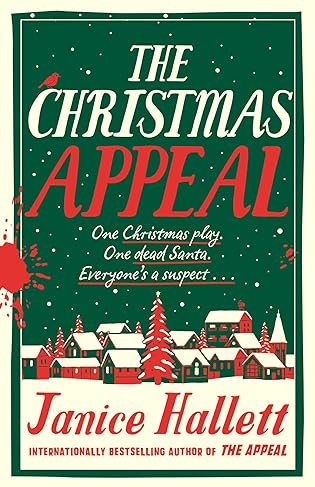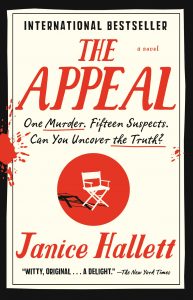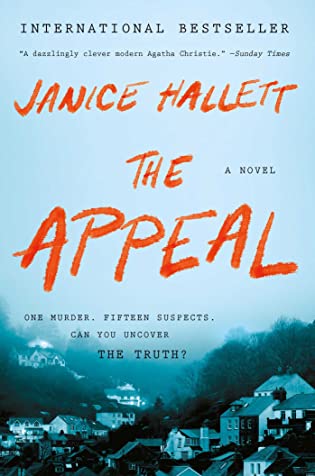 The Christmas Appeal (The Appeal, #1.5) by Janice Hallett
The Christmas Appeal (The Appeal, #1.5) by Janice Hallett Format: eARC
Source: supplied by publisher via Edelweiss
Formats available: hardcover, ebook, audiobook
Genres: holiday fiction, holiday mystery
Series: The Appeal #1.5
Pages: 208
Published by Atria Books on October 24, 2023
Purchasing Info: Author's Website, Publisher's Website, Amazon, Barnes & Noble, Kobo, Bookshop.org, Better World Books
Goodreads
This immersive holiday caper from the “modern Agatha Christie” (The Sunday Times, London) follows the hilarious Fairway Players theater group as they put on a Christmas play—and solve a murder that threatens their production.
The Christmas season has arrived in Lower Lockwood, and the Fairway Players are busy rehearsing their festive holiday production of Jack and the Beanstalk to raise money for a new church roof. But despite the season, goodwill is distinctly lacking among the amateur theater enthusiasts with petty rivalries, a possibly asbestos-filled beanstalk, and some perennially absent players behind the scenes.
Of course, there’s also the matter of the dead body onstage. Who could possibly have had the victim on their naughty list? Join lawyers Femi and Charlotte as they investigate Christmas letters, examine emails, and pore over police transcripts to identify both the victim and killer before the curtain closes on their holiday production—for good.
My Review:
When we open the pages of texts and emails between newly fledged lawyers Femi Hassan and Charlotte Holroyd and their retired mentor Roderick Tanner and read, along with Femi and Charlotte, that he has another epistolary mystery for them to solve in regards to the Fairway Players it all seems just a bit familiar. And a bit cringeworthy. After the correspondence among the Fairway Players that Tanner asked Hassan and Holroyd to wade through in their earlier mystery, The Appeal, that cringe is entirely justified.
Because the Fairway Players were a LOT. And still, apparently, are. Not even a different lot, for the most part, as those events rather cost them a lot of membership – along with prestige and more than a bit of cash.
It also, in the end, took out the Church Hall Roof where they perform – or at least the gargantuan patty of bat guano that was discovered during that epic production did. Let’s just say that not only were there bats in that belfry – along with the belfries of some of the Players themselves – but that the escape of those bats left quite the calling card.
Ahem.
The thing about the pile of correspondence that Hassan and Holroyd had to wade through began with no certainty that a crime had been committed. There seemed to be plenty of dirty dealing, underhanded bargaining and outright shenanigans among the group, but being an arsehole, or even an entire company of arseholes, is not covered under the penal code.
Fraud, however, is another matter, as Hassan and Holroyd eventually proved. To the point where anyone would be surprised to learn that the Fairway Players had survived that debacle.
But the show must go on, even if its former directors are serving time, and the Fairway Players have indeed continued their amateur thespian productions, with occasionally catastrophic results. Again.
The pile of assorted texts and emails is considerably smaller this time around, as the play at the heart of the matter is merely a one-night panto to raise money for that Church Hall Roof that the bats had such a disastrous effect on.
The question for the new lawyers, just as it was in The Appeal when they were still in training, is whether or not ANY of the events that surround their disastrous production of Jack and the Beanstalk constitute a criminal offense under any statute.
The mummified corpse that tobogganed out of the massive old prop beanstalk notwithstanding. Or perhaps, with all the standing for a charge of murder.
 Escape Rating A-: I have to admit that my first question when I saw this book was whether it was a good idea to go back to the scene and the style of The Appeal. It was absolutely fantastic and I loved every page of it, but I wondered whether it would work to revisit that scene and most of those people and particularly whether it would work if done exactly the same way.
Escape Rating A-: I have to admit that my first question when I saw this book was whether it was a good idea to go back to the scene and the style of The Appeal. It was absolutely fantastic and I loved every page of it, but I wondered whether it would work to revisit that scene and most of those people and particularly whether it would work if done exactly the same way.
Epistolary novels, meaning stories told through correspondence, are difficult to pull off at the best of times. The Appeal did it so damn well that there was a lot of potential for a second bite at that apple to turn out to have gone ‘off’ a bit and would sour the original along with it.
That’s not the case, not at all. Because these people are STILL a collection of hot messes and time has not made any of their situations any better. The Christmas Appeal does not sell the reader on the joys of community theater, because there’s more drama offstage than on and a lot of the internal relationships are downright toxic, but for the reader it does create that same compulsive need to turn page after page from the beginning to several potential bitter ends.
At first, the correspondence covers petty rivalries, equally petty jealousies, the usual number of folks not keeping their commitments, and the general pandemonium of putting on a production utilizing the skills and talents of folks who are all volunteers and can – and do – flake off whenever life happens. Which of course it does, pretty much all the time.
At least until the mummified skeleton slides out of the old theater prop in the middle of the show and the questions all shift from “are we going to pull this off” to “who was that mummified man in the Santa hat and how did he get stuffed in there?” Along with the when and why questions about that same stand in, so to speak, for Jack Skellington.
Just because there’s a dead body, it doesn’t mean that there’s been a murder. Which is what Hassan and Holroyd have to decide, now that they have all the facts. While we, the readers, have all of the speculation.
Leading to just the kind of holiday mystery to keep any reader on the edge of their seat, flipping pages, as the spirit of the holidays ensures that the show is a success, the Church Hall Roof is saved, and justice gets served along with the plum pudding.
If you like your holiday stories to be every bit as twisted as the stripes on a candy cane, The Christmas Appeal might prove just as tasty as the refreshing mint of those striped canes.

 The Appeal by
The Appeal by